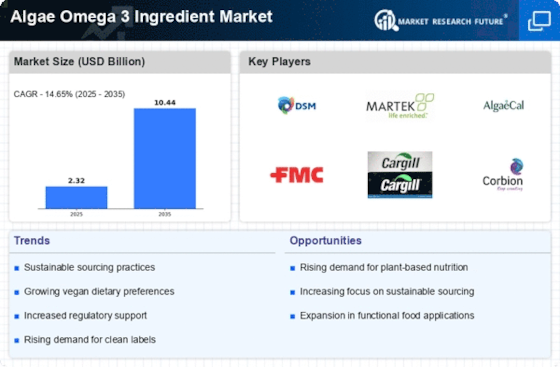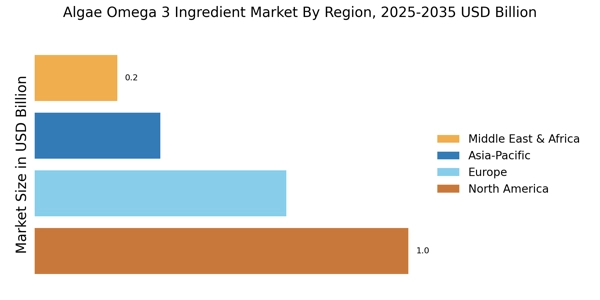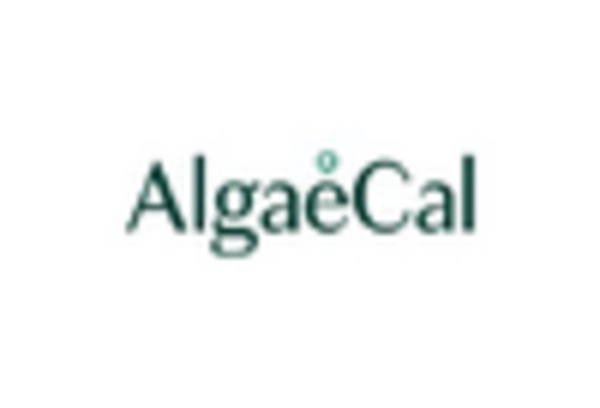Health Conscious Consumer Behavior
The algae omega 3 ingredient Market is benefiting from a growing trend of health-conscious consumer behavior. As individuals become more informed about the health benefits associated with omega-3 fatty acids, there is an increasing inclination towards supplements that offer these essential nutrients. Algae omega-3 products are perceived as a cleaner, more sustainable source of omega-3s, appealing to consumers who prioritize health and wellness. Recent surveys indicate that a significant percentage of consumers are willing to pay a premium for high-quality, plant-based omega-3 supplements. This trend suggests that the market for algae omega-3 ingredients could see substantial growth as more consumers seek to enhance their diets with beneficial nutrients.
Rising Demand for Plant-Based Alternatives
The Algae Omega 3 Ingredient Market is experiencing a notable surge in demand for plant-based alternatives to traditional fish-derived omega-3 sources. This trend is largely driven by increasing consumer awareness regarding sustainability and the environmental impact of overfishing. As more individuals adopt vegetarian and vegan lifestyles, the preference for algae-based omega-3 supplements is likely to grow. Market data indicates that the plant-based omega-3 segment is projected to expand significantly, with estimates suggesting a compound annual growth rate of over 10% in the coming years. This shift not only reflects changing dietary preferences but also highlights the potential for algae omega-3 products to capture a larger share of the nutritional supplement market.
Growing Awareness of Environmental Sustainability
The Algae Omega 3 Ingredient Market is increasingly influenced by growing awareness of environmental sustainability. Consumers are becoming more conscious of the ecological impact of their dietary choices, leading to a preference for sustainable sources of omega-3 fatty acids. Algae, as a renewable resource, presents a viable alternative to fish-derived omega-3s, which are often associated with overfishing and habitat destruction. Market Research Future suggests that consumers are more likely to choose products that align with their values regarding sustainability. This trend indicates a potential for algae omega-3 products to gain traction among environmentally conscious consumers, thereby expanding the market and encouraging manufacturers to prioritize sustainable practices.
Innovations in Extraction and Production Technologies
The Algae Omega 3 Ingredient Market is witnessing advancements in extraction and production technologies that enhance the efficiency and quality of omega-3 extraction from algae. Innovations such as supercritical fluid extraction and enzymatic processes are being adopted to improve yield and reduce production costs. These technological advancements not only make algae omega-3 more accessible but also ensure that the final products meet stringent quality standards. As production methods become more refined, the market is likely to see an influx of high-quality algae omega-3 products, which could further stimulate consumer interest and drive sales. The potential for cost-effective production may also attract new entrants into the algae omega-3 market.
Increased Regulatory Support for Nutritional Supplements
The Algae Omega 3 Ingredient Market is benefiting from increased regulatory support for nutritional supplements, particularly those derived from natural sources. Governments and health organizations are recognizing the importance of omega-3 fatty acids in promoting overall health, leading to favorable regulations that encourage the use of algae-based omega-3 products. This regulatory environment is likely to foster innovation and investment in the algae omega-3 sector, as companies seek to develop new formulations and delivery methods. Furthermore, as regulatory bodies establish clearer guidelines for labeling and health claims, consumer trust in algae omega-3 products may increase, potentially driving market growth.


















